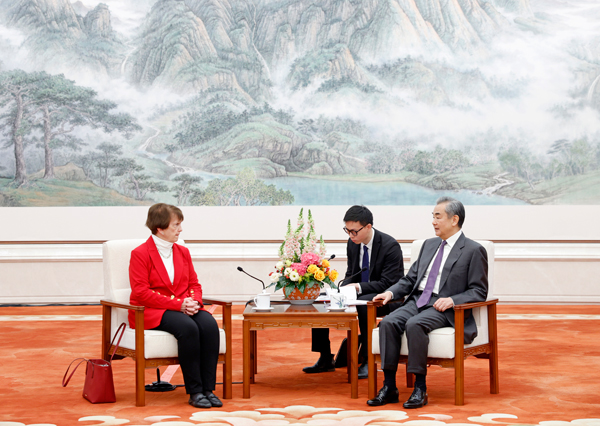
 0 Comment(s)
0 Comment(s) Print
Print E-mail Xinhua, December 4, 2024
E-mail Xinhua, December 4, 2024

Chinese Foreign Minister Wang Yi, also a member of the Political Bureau of the Communist Party of China Central Committee, meets with a delegation led by Susan Elliott, president and chief executive officer of the National Committee on American Foreign Policy (NCAFP) in Beijing on Dec. 3, 2024. [Photo/Chinese Ministry of Foreign Affairs]
China hopes that the incoming U.S. administration will properly handle its first steps in China-U.S. relations, Chinese Foreign Minister Wang Yi said on Tuesday.
Wang, also a member of the Political Bureau of the Communist Party of China Central Committee, made the remarks when meeting with a delegation led by Susan Elliott, president and chief executive officer of the National Committee on American Foreign Policy (NCAFP).
Wang said that China's foreign policy, including its U.S. policy, has maintained its stability and continuity, which shows its determination and credibility as a major country.
China will always improve and develop its relations with the United States in accordance with the principles of mutual respect, peaceful coexistence and win-win cooperation, no matter what changes take place in the United States, Wang said.
Wang quoted remarks by Chinese President Xi Jinping on China's expectation of the Sino-U.S. relations in the future during his meeting last month with U.S. President Joe Biden on the sidelines of the 31st APEC Economic Leaders' Meeting in Lima, Peru.
China's goal of a stable, healthy and sustainable China-U.S. relationship remains unchanged; its commitment to mutual respect, peaceful coexistence and win-win cooperation as principles for handling China-U.S. relations remains unchanged; its position of resolutely safeguarding China's sovereignty, security and development interests remains unchanged; and its desire to carry forward the traditional friendship between the Chinese and American peoples remains unchanged, Wang said.
He pointed out that the future direction of China-U.S. relations depends on the choice of the U.S. side, and expressed the hope that the U.S. side will work with China to meet each other halfway.
The United States must not waver in developing steady relations with China, Wang said. He urged the U.S. side to do more to stabilize bilateral relations and expressed the hope that the incoming U.S. administration will handle its first steps in China-U.S. relations properly.
The United States must have the correct strategic perception. Noting that China's development and revitalization is inevitable, Wang said China has no intention to challenge or replace the United States, while the U.S. side should not be obsessed with winning the competition against China.
Wang called for continued dialogue, saying that dialogue may not solve all the problems, but will help promote mutual understanding, avoid miscalculations and advance cooperation.
The United States must not cross the bottom lines and red lines in bilateral relations, Wang said. He pointed out that the Taiwan question falls under China's internal affairs, and the United States should honor its commitment to the one-China principle and respect the development path chosen by the Chinese people, as well as their legitimate right to development.
Cultural and people-to-people exchanges between the two countries must not be reversed, Wang said. He added that China will continue to support and facilitate the exchange of personnel between the two countries, and welcomes more U.S. nationals from all walks of life to visit and seek exchange in China.
The U.S. delegation said that the goal and mission of the NCAFP is to strengthen the U.S.-China relationship, seek common ground and enhance understanding.
U.S.-China relations have been at a crossroads many times in history, and at this time of change for the U.S. administration, it is expected that the two countries will maintain effective communication, continue to carry out strategic dialogue, strengthen people-to-people exchange and stabilize bilateral ties, which will be of great importance to both countries and the world, according to the delegation.
The NCAFP said that it will, as always, play its role as a bridge and make efforts toward the positive development of U.S.-China relations.